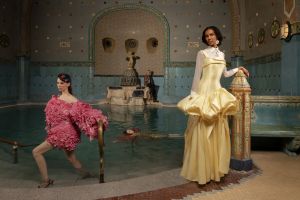The young Hungarian designers’ unmatched creativity
The Hungarian Fashion & Design Agency’s second Young Talents mentoring programme has reached its end. It provided an improvement opportunity for seven graduate fashion designers and supported them in starting their journey to world fame. The mostly business-focussed mentoring programme offered detailed insight into important topics such as brand improvement, pricing, content writing and social media basics. This year, the course put a particular emphasis on sustainability and cultural appropriation. Based on their accounts, the young designers were enriched with valuable business knowledge, which they will utilise in the next phase of their careers.
The Hungarian Fashion & Design Agency’s Young Talents programme’s aim is to provide an opportunity for graduate designers to gain valuable experience for their professional debut with collective and individual consultations and workshops. All of the mentors were important figures of the domestic and international fashion industry; among them were Kriszta Maróy, the Hungarian founder and chief editor of the Glamour fashion magazine, Emese Dobos fashion journalist, and Réka Szentesi, sustainability expert. The programme’s uniqueness is the vital business focus; thus, pricing, investment opportunities, fashion copywriting, and the selection of image design plans play an essential role. Furthermore, as an innovation of the programme, the course was supplemented with knowledge of the circular economy and a career opportunities workshop of particular importance to young people, in which the industry was discussed from several aspects with the help of various professionals. Finally, the mentorees presented their brand concept at the end of the course, which constituted the proper basis for launching their enterprise and finding future investors.
This summer, five brands – GERUDA, DAN!ELLE, JLIAM, Magnesium, and Szigeti Orsolya – and a duo of MOME students – Pitenyák Boglárka, Steigervald Priszcilla – participated in the second Young Talents programme. The brands’ concept, message, and style demonstrate an extremely colourful palette.
Gerda Baranyi’s brand, GERUDA, pays special attention to sustainability. Her innovative, reversible, one-size pieces were designed for more occasions and sizes at the same time. In her brand concept, the issue of big data, which explores the question of sustainable database management of the 21st century, occupies an important place. “Blockchain” also plays a pivotal role. The designer uses it to produce pieces that belong to only one person; thus, creating more added value.
Gerda Marada, the creator of the Magnesium brand, targets especially members of the skateboarding, underground subculture. In Magnesium’s pieces, the classical world of urban design of the 90s returns. The brand believes sustainability is fundamental; hence local or European producers will manufacture the pieces. The brand’s founder visualises a webshop and a complex physical shop for sales – a community space, a café, a gallery, and a screen workshop at once. For Gerda, the mentoring programme was outstandingly helpful in the topics of circular economy and social media, which drew attention to the proper use of social media platforms and the importance of regular communication.
Daniella Sovány raises attention to accepting one another with her brand DAN!ELLE. She wants to create real value with her unisex clothes. She designed her collection for four different characters whom society – as she put it – excludes voluntarily or involuntarily. On the survey at the end of the course, for Daniella, courses about business, especially those about effective brand building, were the most interesting. She also learned a lot about fashion copywriting.
Orsolya Szigeti wants to create a “zero waste” collection based on variability. She mostly designs knitted and fabric dresses and reuses all textile waste. Her goal is to create nonseasonal collections which can be worn any time and are multifunctional. For Orsolya, workshops about brand improvement and sustainability were the most useful, during which she learnt to think comprehensively about design, competitors, and the audience.
Júlia Kőszegi, founder of the brand JLIAM also thinks in terms of a unisex brand. She wants to make everyday’s stressful situations easier with her modern and functional clothes. As she put it, the mentoring programme gave her all the base she needed for launching a successful brand. In addition, it helped her consider and refine her brand concept and understand her competitors’ strategies.
A speciality of this year’s mentoring programme is that two students of the Moholy-Nagy University participated in one joint project. Boglárka Pitenyák and Priszcilla Steigervald created a niche service that helps small enterprises and designer keep their ecological footprint small. On their platform, customers can buy patterns, and the designer and the dressmaker share the profit. The concept calls attention to the importance of local production and equality. The most useful workshop for the two MOME students was about pricing, which they learnt to work out comprehensively.
More articles

Innovation and Financing – The Creative Forum Targeting Creative Industry Businesses Continues

Fashion, Culture, and Shopping Experiences During BCEFW



